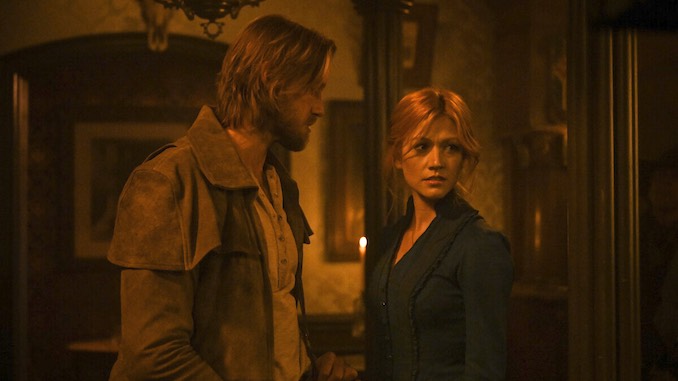Prequel Series Walker: Independence Is Both a Classic Western and Classically CW
Photo Courtesy of The CW TV Reviews Walker: Independence
It would be an understatement to say that the Western has been done before, but it’s not a stretch to say that it’s never been done quite like this. Offering Clint Eastwood by way of The CW, Walker: Independence is a fun Western romp filled with all the CW-isms you would expect, and all the genre subversions you maybe wouldn’t. In the first three episodes available for review, Walker: Independence establishes itself as both familiar and strikingly unique, making it a fun offering for the fall TV season.
Walker: Independence, from showrunner Seamus Fahey, is a prequel of the three-seasons-deep Walker, a reboot of the series Walker, Texas Ranger, which aired through 2001. The new series follows Cordell Walker’s (Jared Padalecki) ancestor Abigail Walker (Katherine McNamara) as she attempts to avenge the death of her husband in a burgeoning Texas town called Independence. Harboring secrets of her own, she joins forces with Hoyt Rawlins (Matt Barr) and Calian of the Apache tribe (Justin Johnson Cortez) to take down the new sheriff of the town, who they believe is responsible for Abigail’s husband’s murder. Along with new friends Kate (Katie Findlay), Kai (Lawrence Kao), and Luisa (Gabriela Uezada), Abby must wrestle with the lawlessness of the Wild West as she enters into Sheriff Tom Davidson’s (Greg Hovanessian) game of cat and mouse.
On the surface, Independence is exactly what you would expect of The CW’s take on a Western: A group of attractive people (many of whom have been plucked from other CW shows) being faced with as harsh a Wild West reality that a TV-14 rating can justify—but it also offers much more than that. While Abby Walker still remains the victim of a blossoming CW love triangle, she also acts as the classic Western hero, torn apart by the struggle between vengeance and justice—except with one important difference: she’s a woman. The intersection of Abby’s mission and her womanhood is one of the most interesting elements of the series, especially as she is challenged by the constraints of the time, while often using those same constraints to her advantage. The push and pull between her and Sheriff Davidson is rich psychological warfare, as Abby uses the sheriff’s period-accurate assumptions to her advantage in her quest for justice—all played wonderfully by a teary-eyed Katherine McNamara.
Additionally, the Western is known for having done a disservice to essentially every group of people except white men, and Independence puts in a lot of effort to correct that. Matt Barr’s Hoyt is the one remaining holdover from classic Western canon, acting as the lovable but frustrating rascal with an aversion to sobriety. Other than Hoyt’s predictable (yet still enjoyable) storyline, the series makes broad attempts to right the wrongs of the genre, and three episodes in, its efforts are not in vain.
Calian’s storyline as a Native American man torn between his people and his inexplicable connection with Abby is the series’ most interesting thread, especially as the Apache tribe are shown in an extremely respectful light, which is in stark contrast to the villainous portrayal all Natives suffered at the hands of the Westerns of the past. Kai also acts as a highlight of those forgotten by the genre, as he is a Chinese immigrant that once worked on the railroad, and now lives and works in Independence. Kate is an interesting addition to the series as well, especially as one of the only women with any semblance of power in Independence; without giving too much away, there’s much more to her than a hilariously small parasol and a kind heart.
While the series does offer us these wonderful characters, as well-rounded and subversive as they are, some moments feel like missed opportunities in the opening episodes, providing surface-level explorations that will hopefully be expanded on within the rest of the season. At times, Independence leans too heavily on its CW-isms, opting for episodic plots that feel well-trodden, though not entirely to the show’s detriment. It feels familiar to long-time viewers of the network, making for a Western-style series that still has appeal even to those not otherwise interested in the genre.
Even though Independence is a prequel to Walker, watching that series is not a prerequisite for enjoying this one, as the decades between each storyline make their overlap extremely minimal. Though that’s not to say there’s nothing for Walker fans to look forward to, with subtle Easter eggs thrown into each episode as a little treat for those loyal to this burgeoning franchise.
If you have ever wondered what Unforgiven would look like if it were produced by The CW, or if you simply are intrigued by the diversification of the Western genre that this series provides, then this is absolutely the show for you. While I wouldn’t say this series is quintessential viewing (especially during this stacked fall TV season), it remains a fun show to catch each week, and is another shining addition to The CW’s line-up of unique series.
Walker: Independence premieres Thursday, October 6th on The CW, and streams the next day on The CW App.
Anna Govert is an entertainment writer based in middle-of-nowhere Indiana. For any and all thoughts about TV, film, and the wonderful insanity of Riverdale, you can follow her @annagovert;.
For all the latest TV news, reviews, lists and features, follow @Paste_TV.